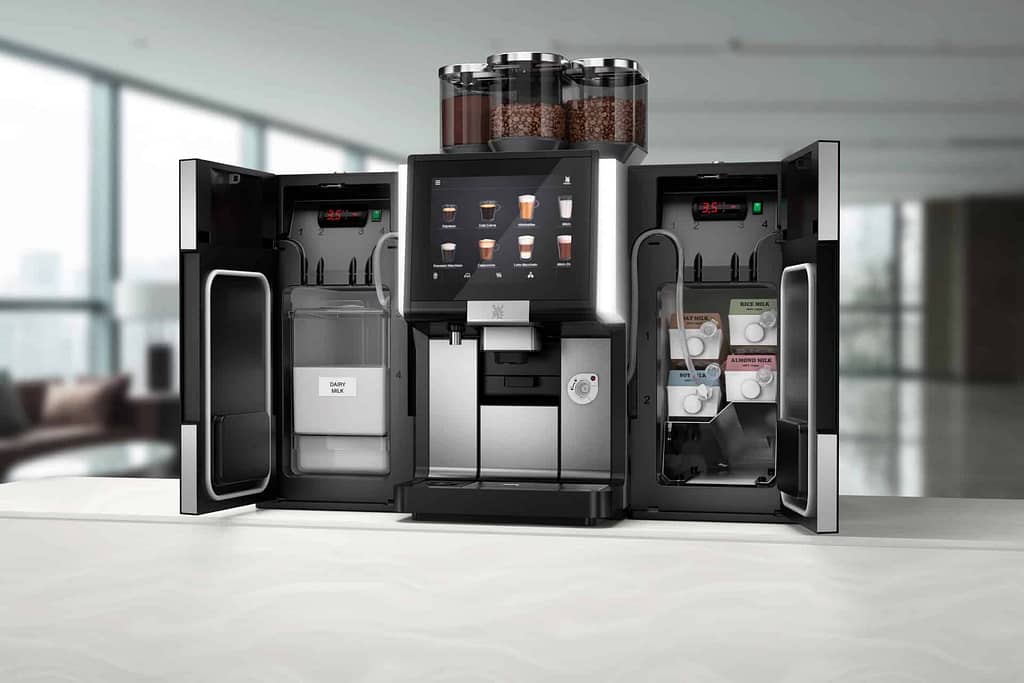[[{“value”:”
WMF explains how it’s adjusting its coffee machines to benefit both dairy and dairy alternatives.
WMF’s machines have catered to the requirements of dairy milk for decades, but this doesn’t mean the company hasn’t kept up to date with innovations in the dairy alternative industry.
The German coffee machine manufacturer constantly focuses on future trends and how it can adapt and improve its machines. Axel Fähnle, Head of Global Marketing for GBU Professional Coffee Machines at WMF GmbH, says WMF recognised early on that milk research needs to be a priority.
“In the early 1990s, our fully automatic coffee machines were among the first capable of producing high-quality milk foam, especially when using the WMF Bistro model,” he says. “Since then, a lot has happened in the world of international coffee specialties, so our job now is to reflect these developments in our machines and make them accessible for every user.”
Axel believes there is one trend that has specifically shifted coffee culture in the industry.
“Plant-based milk alternatives are fuelling a new freedom in the creation and preparation of coffee specialties,” he says. “Vegan coffee beverages are no longer considered alternative drinks but are becoming their own new category.”
Axel says the popularity of plant-based milk alternatives continues to impact coffee consumption habits, and will evolve as an independent beverage category.
“It’s changing the way the world drinks coffee, and our customers – such as big café chains, petrol stations, hotels, and catering companies – must address it,” he says.
Axel credits the United States, China, and Australia as pioneers of the alternative dairy movement.
“China in particular is an important driver of new trends,” he says. “The focus there is not on reinventing the cappuccino, but on constantly coming up with new creations made from milk, milk alternatives, and countless other ingredients such as syrups, toppings, colours, and every conceivable form of sweetness.”
He says this is a stark contrast to Australia, where coffee is consumed in a less “colourful” way.
“The quality of the coffee shops [in Australia] set an international benchmark, which is why many large operators are testing new coffee concepts in the country,” Axel says. “Many innovative customer requirements originate from Australia.”
As such, Axel says it is WMF’s duty as an innovative manufacturer to promote knowledge and understanding in the market, and to demonstrate the technical possibilities for handling milk alternatives in a reliable and flexible manner.
For WMF, its coffee and product training teams are vital in this education process. They are made up of coffee experts who look to answer the more common questions clients have: what is the best way to process individual coffee varieties? What technical features do WMF’s machines offer? How can each machine be individually adapted to serve different tasks? And what specific steps are needed when handling raw materials?
Axel says one of the recurring issues young coffee professionals have with alternative milks is getting the texture right. To alleviate any inconsistency, WMF has introduced the Auto Steam system, which can be tailored to any kind of milk, and be customised for different foam density settings.
This function is available in the fully automatic WMF 1100 S, WMF 5000 S+, and WMF 9000 S+ models, as well as its semi- automatic WMF espresso NEXT portafilter.
“On one hand, the WMF espresso NEXT enables a high degree of flexibility in the use of milk and milk alternatives, while on the other, it offers important safety features and efficiency thanks to its steam and dosing systems. This makes it the perfect machine for outstanding milk concepts on service operation counters, and allows the barista to feel included,” Axel says.
In its range of fully automatic machines, WMF has responded to the need for flexibility with its 2-milk system, which caters to any plant-based milk alternative, including oat, soy, or pea drinks, in one machine. More recently, the brand has introduced the MultiMilk system, which processes more than two milk varieties almost contamination-free.
“Dairy milk runs through the machine’s pre-existing integrated milk system, while plant-based milks are fed into the machine through several lances in the MultiMilk system,” Axel says. “With these solutions, we are well positioned to meet the requirements of the market to dose and process multiple milk alternatives separately yet automatically.”
Moreover, Axel says machine cleaning is just as important. WMF has taken this into consideration and introduced its AutoClean system, a machine option for fully automated cleaning of all milk- and coffee-carrying parts.
“The aim is to automate as many cleaning tasks as possible, especially in the office and other self-serving areas,” Axel says. “The more complex a machine’s system landscape is, the more standardised and reliable the cleaning process has to be, especially in an almost contamination-free two-milk solution.”
Axel is confident that, with these solutions, WMF will be equipped to handle any future trends in the milk landscape.
“Plant-based milk alternatives have developed, and will continue to develop, as a prominent independent beverage category,” he says.
For more information, visit wmf-coffeemachines.com
This article appears in the April 2024 edition of BeanScene. Subscribe HERE.
“}]]


